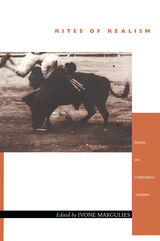2 books about Margulies, Ivone

Nothing Happens
Chantal Akerman’s Hyperrealist Everyday
Ivone Margulies
Duke University Press, 1996
Through films that alternate between containment, order, and symmetry on the one hand, and obsession, explosiveness, and a lack of control on the other, Chantal Akerman has gained a reputation as one of the most significant filmmakers working today. Her 1975 film Jeanne Dielman, 23 Quai du Commerce, 1080 Bruxelles is widely regarded as the most important feminist film of that decade. In Nothing Happens, Ivone Margulies presents the first comprehensive study of this influential avant-garde Belgian filmmaker.
Margulies grounds her critical analysis in detailed discussions of Akerman’s work—from Saute ma ville, a 13-minute black-and-white film made in 1968, through Jeanne Dielman and Je tu il elle to the present. Focusing on the real-time representation of a woman’s everyday experience in Jeanne Dielman, Margulies brings the history of social and progressive realism and the filmmaker’s work into perspective. Pursuing two different but related lines of inquiry, she investigates an interest in the everyday that stretches from postwar neorealist cinema to the feminist rewriting of women’s history in the seventies. She then shows how Akerman’s “corporeal cinema” is informed by both American experiments with performance and duration and the layerings present in works by European modernists Bresson, Rohmer, and Dreyer. This analysis revises the tired opposition between realism and modernism in the cinema, defines Akerman’s minimal-hyperrealist aesthetics in contrast to Godard’s anti-illusionism, and reveals the inadequacies of popular characterizations of Akerman’s films as either simply modernist or feminist.
An essential book for students of Chantal Akerman’s work, Nothing Happens will also interest international film critics and scholars, filmmakers, art historians, and all readers concerned with feminist film theory.
Margulies grounds her critical analysis in detailed discussions of Akerman’s work—from Saute ma ville, a 13-minute black-and-white film made in 1968, through Jeanne Dielman and Je tu il elle to the present. Focusing on the real-time representation of a woman’s everyday experience in Jeanne Dielman, Margulies brings the history of social and progressive realism and the filmmaker’s work into perspective. Pursuing two different but related lines of inquiry, she investigates an interest in the everyday that stretches from postwar neorealist cinema to the feminist rewriting of women’s history in the seventies. She then shows how Akerman’s “corporeal cinema” is informed by both American experiments with performance and duration and the layerings present in works by European modernists Bresson, Rohmer, and Dreyer. This analysis revises the tired opposition between realism and modernism in the cinema, defines Akerman’s minimal-hyperrealist aesthetics in contrast to Godard’s anti-illusionism, and reveals the inadequacies of popular characterizations of Akerman’s films as either simply modernist or feminist.
An essential book for students of Chantal Akerman’s work, Nothing Happens will also interest international film critics and scholars, filmmakers, art historians, and all readers concerned with feminist film theory.
[more]

Rites of Realism
Essays on Corporeal Cinema
Ivone Margulies, ed.
Duke University Press, 2003
Rites of Realism shifts the discussion of cinematic realism away from the usual focus on verisimilitude and faithfulness of record toward a notion of "performative realism," a realism that does not simply represent a given reality but enacts actual social tensions. These essays by a range of film scholars propose stimulating new approaches to the critical evaluation of modern realist films and such referential genres as reenactment, historical film, adaptation, portrait film, and documentary.
By providing close readings of classic and contemporary works, Rites of Realism signals the need to return to a focus on films as the main innovators of realist representation. The collection is inspired by André Bazin's theories on film's inherent heterogeneity and unique ability to register contingency (the singular, one-time event). This volume features two new translations: of Bazin's seminal essay "Death Every Afternoon" and Serge Daney's essay reinterpreting Bazin's defense of the long shot as a way to set the stage for a clash or risky confrontation between man and animal. These pieces evince key concerns—particularly the link between cinematic realism and contingency—that the other essays explore further.
Among the topics addressed are the provocative mimesis of Luis Buñuel's Land Without Bread; the adaptation of trial documents in Carl Dreyer's Passion of Joan of Arc; the use of the tableaux vivant by Wim Wenders and Peter Greenaway; and Pier Paolo Pasolini's strategies of analogy in his transposition of The Gospel According to St. Matthew from Palestine to southern Italy. Essays consider the work of filmmakers including Michelangelo Antonioni, Maya Deren, Mike Leigh, Cesare Zavattini, Zhang Yuan, and Abbas Kiarostami.
By providing close readings of classic and contemporary works, Rites of Realism signals the need to return to a focus on films as the main innovators of realist representation. The collection is inspired by André Bazin's theories on film's inherent heterogeneity and unique ability to register contingency (the singular, one-time event). This volume features two new translations: of Bazin's seminal essay "Death Every Afternoon" and Serge Daney's essay reinterpreting Bazin's defense of the long shot as a way to set the stage for a clash or risky confrontation between man and animal. These pieces evince key concerns—particularly the link between cinematic realism and contingency—that the other essays explore further.
Among the topics addressed are the provocative mimesis of Luis Buñuel's Land Without Bread; the adaptation of trial documents in Carl Dreyer's Passion of Joan of Arc; the use of the tableaux vivant by Wim Wenders and Peter Greenaway; and Pier Paolo Pasolini's strategies of analogy in his transposition of The Gospel According to St. Matthew from Palestine to southern Italy. Essays consider the work of filmmakers including Michelangelo Antonioni, Maya Deren, Mike Leigh, Cesare Zavattini, Zhang Yuan, and Abbas Kiarostami.
Contributors: Paul Arthur, André Bazin, Mark A. Cohen, Serge Daney, Mary Ann Doane, James F. Lastra, Ivone Margulies, Abé Mark Normes, Brigitte Peucker, Richard Porton, Philip Rosen, Catherine Russell, James Schamus, Noa Steimatsky, Xiaobing Tang
[more]
READERS
Browse our collection.
PUBLISHERS
See BiblioVault's publisher services.
STUDENT SERVICES
Files for college accessibility offices.
UChicago Accessibility Resources
home | accessibility | search | about | contact us
BiblioVault ® 2001 - 2024
The University of Chicago Press









